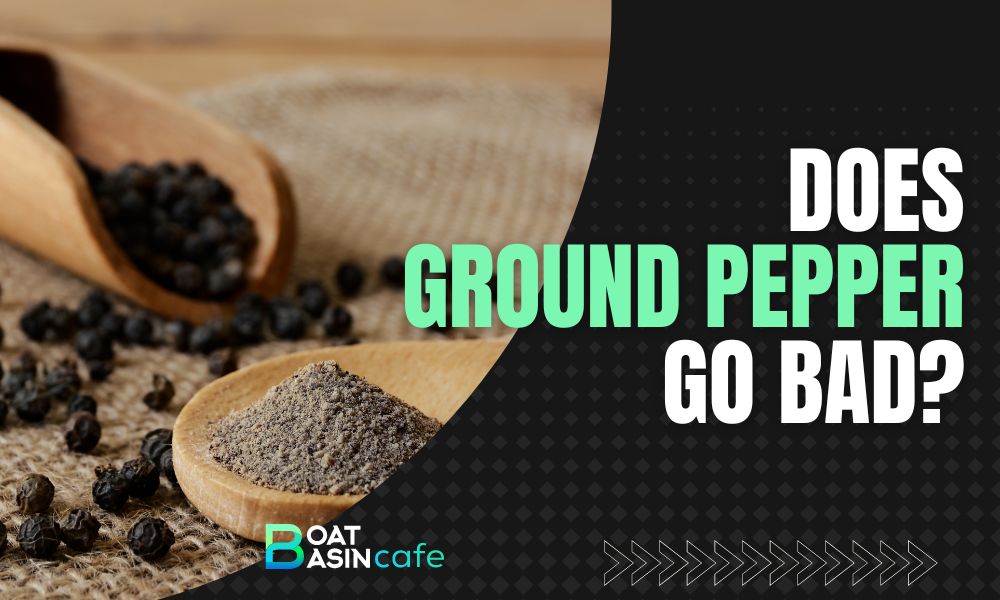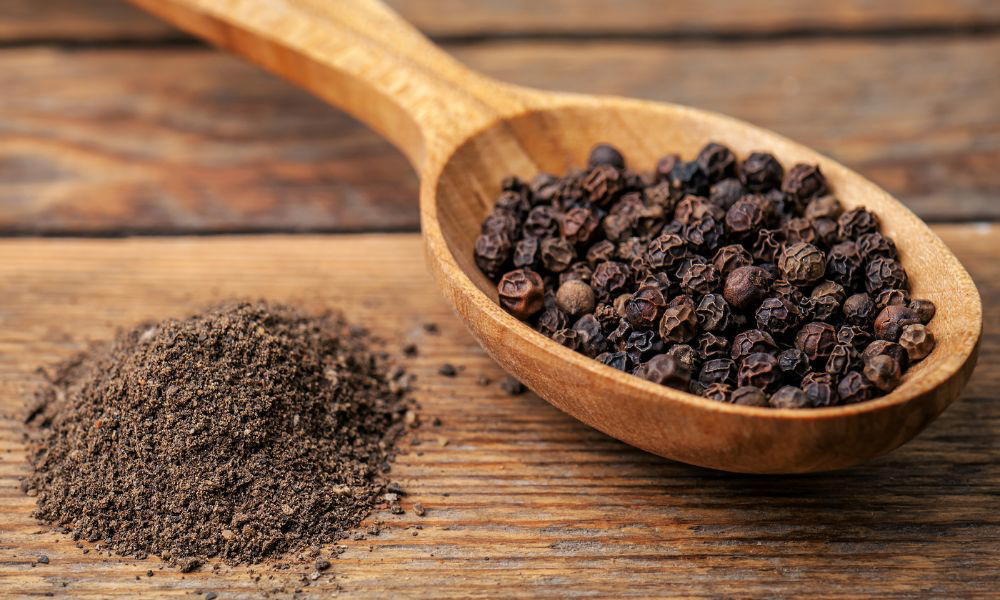Are you aware that ground pepper, an essential kitchen staple, can lose its potency and develop off-flavors over time? Have you ever found yourself asking, “Does ground pepper go bad?” If so, you’ve come to the right place.
In this comprehensive guide, you’ll learn all about the shelf life, quality, and proper storage of ground pepper, ensuring that you always have fresh, flavorful spices on hand for your culinary creations.

Understanding Ground Pepper Shelf Life
Ground pepper, particularly ground black pepper, is derived from the berries of the Piper nigrum plant, commonly known as peppercorns. These berries can be processed in different ways to create various types of pepper, such as ground black pepper, ground white pepper, and many more. The composition of ground pepper is primarily determined by the processing method and the type of peppercorn used.
Various factors affect the shelf life of ground pepper, which generally ranges from six months to three years, depending on the form. Whole peppercorns can retain their flavor for a longer period, up to about four years if stored properly. However, the shelf life of pre-ground pepper is significantly shorter, as grinding exposes the volatile oils and flavor compounds within the pepper, which are prone to degradation over time.
As ground pepper ages, it may not necessarily spoil in the conventional sense of rotting or developing mold. Instead, it can lose its potency and develop off-flavors, diminishing the quality of your culinary creations.
Signs of Spoiled Ground Pepper
Identifying spoiled ground pepper is essential for avoiding potential health risks and maintaining the taste and aroma of your dishes. Common signs of ground pepper going bad include:
- Loss of aroma: Fresh ground pepper should have a strong, pungent smell. If the aroma is weak or absent, it’s a sign that the ground pepper has lost its potency.
- Off-flavors: Spoiled or rancid ground pepper may develop a bitter or otherwise unpleasant taste that can negatively affect your recipes. This can be easily detected by dabbing a small amount of ground pepper on your finger and tasting it.
- Discoloration: Fresh ground pepper should have a vibrant, dark color, whereas spoiled pepper may appear dull or lighter in color.
While consuming expired ground pepper usually doesn’t pose severe health risks, it can lead to gastrointestinal issues or mild allergic reactions in some cases. Hence, it’s best to discard any ground pepper that exhibits signs of spoilage.
Factors Affecting Ground Pepper Quality

Ensuring the quality of your ground pepper involves taking care of various factors that can contribute to its degradation. The most common factors that impact ground pepper quality are:
- Moisture: Excess moisture can cause ground pepper to clump and develop mold or mildew. It’s crucial to store ground pepper in a dry environment and avoid using wet utensils.
- Light: Prolonged exposure to light can break down the flavor compounds in ground pepper, leading to flavor loss. It’s best to store your ground pepper in a cool, dark place.
- Heat: High temperatures can also contribute to the degradation of ground pepper’s flavor. Store it away from heat sources, such as ovens or stovetops.
- Air: Exposure to air can lead to the oxidation of volatile oils and flavor compounds in ground pepper, causing a reduction in its potency. Use airtight containers to minimize air exposure.
Following proper storage techniques will not only help maintain the optimal quality and flavor of your ground pepper but also extend its shelf life.
Extending the Shelf Life of Ground Pepper
To maximize the freshness and longevity of your ground pepper, consider these best practices:
- Purchase smaller quantities: Buying smaller amounts of ground pepper ensures that you use it up before it loses its potency. This also minimizes waste and promotes fresher flavors in your recipes.
- Store in cool, dark, and dry conditions: As discussed earlier, the storage environment plays a significant role in preserving ground pepper quality. Keep your ground pepper in a pantry or cabinet away from sources of heat, light, and moisture.
- Use airtight containers: Select high-quality, airtight containers to store your ground pepper. This will protect it from moisture, air, and light exposure, all of which can degrade the quality of your pepper.
FAQs
How long does ground pepper last?
Ground pepper’s shelf life can range from six months to three years, depending on factors such as storage conditions, the quality of pepper, and whether it’s whole or pre-ground. Under optimal storage conditions, you can typically expect pre-ground pepper to retain its flavor for about a year, while whole peppercorns can last up to four years.
Can you use ground pepper past its expiration date?
Using ground pepper past its expiration date is generally safe, as long as it doesn’t exhibit any signs of spoilage such as mold, off-flavors, or foul smells. However, be aware that ground pepper’s potency and flavor will diminish over time. To ensure the best possible taste in your dishes, try to use ground pepper within its recommended shelf life, and discard any pepper that has lost its aroma or developed off-flavors.
How should I store ground pepper to prolong its shelf life?
Follow these steps to properly store ground pepper and extend its shelf life:
01 Choose an airtight container: Select a high-quality, airtight container made from materials such as glass or ceramic that can block light and air exposure.
02 Label your container: Clearly label the container with the date of purchase and type of ground pepper. This will help you keep track of the pepper’s age and avoid mixing different types of pepper accidentally.
03 Store away from heat, light, and moisture: Keep your ground pepper in a cool, dark, and dry place like a pantry or cupboard. Avoid exposure to direct sunlight and store it away from heat sources like stovetops or ovens.
04 Avoid cross-contamination: Do not use wet or contaminated utensils to scoop out ground pepper, as this can introduce moisture and bacteria, which could lead to spoilage. Always use clean, dry utensils for scooping.
Conclusion
Understanding the shelf life and quality of ground pepper is crucial for maximizing its flavor potential in your cooking. Despite its impressive versatility and resistance to spoilage, ground pepper can still lose its potency and develop off-flavors over time due to factors such as moisture, light, heat, and air exposure. By following proper storage practices and knowing when it’s time to replace your ground pepper, you can continue enjoying its rich, aromatic, and slightly spicy taste in your dishes.
Always remember: Fresh ground pepper is an essential ingredient for creating delicious, memorable meals. Stay mindful of your ground pepper’s condition, and don’t hesitate to replace it when necessary – your tastebuds will undoubtedly thank you!